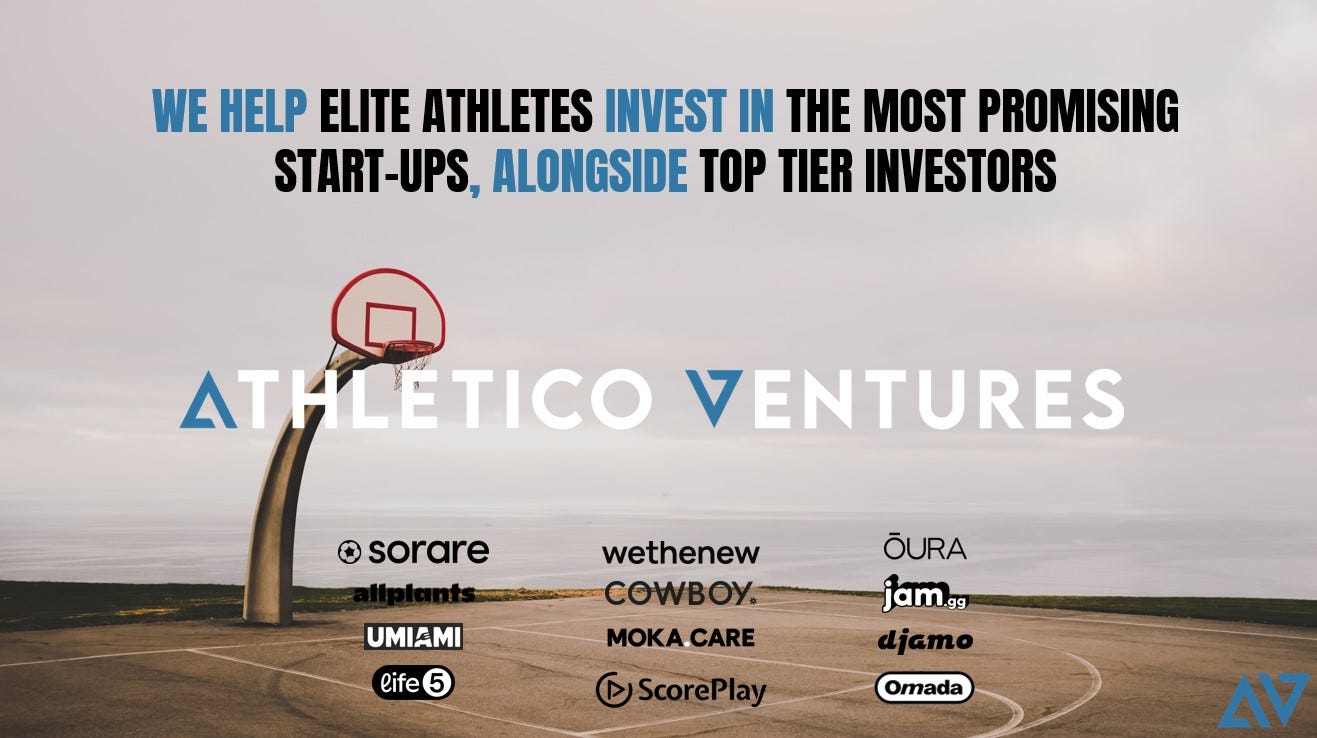VC name: Athletico Ventures
Headquartered: Paris (FR)
Founded: 2020
Managing Partner: Arthur Bernard
Website: https://www.athletico.vc/
Sectors: Agnostic with important focus on Consumer, Impact and Sports & Entertainment
Investment stage: Late seed to Series B
Typical investment range: $150K-$500K
Total number of investments: 16
Investments to date:
— Investments by deal syndication:
Wethenew (Frank Ntilikina, New York Knicks // Series A alongside Singular)
Sorare (Antoine Griezmann, FC Barcelone // Series A alongside Benchmark and Accel)
Oura (undisclosed NBA and F1 athletes // Series C alongside The Chernin Group and Elysian Park)
Sorare (César Azpilicueta and three other athletes // Series B alongside Softbank, Atomico, Bessemer Ventures, Eurazeo, etc.)
All Plants (Kieran Gibbs // Series B alongside Draper Esprit, Octopus Ventures, Felix Capital, etc.)
Cowboy (undisclosed English football player // Series C alongside HCVC, Exor, Index, Tiger, etc.)
Piepacker (three undisclosed athletes [F1, football and eSports] // Series A alongside Lego Ventures, Serena and Makers Funds)
Umiami (one undisclosed football player // Series A alongside Astanor, Redalpine, BPI, etc.)
moka.care (Antoine Griezmann // Series A alongside Left Lane and Singular)
African neobank (Ivorian football player // Series A alongside Partech Africa)
— Investments with AV Collectiv#1 (not all of them announced yet)
Platform for freelancers (5m€ pre-series A)
eSports data (1.7m€ pre-Series A)
Life5 (Life insurance // 10m€ Series A alongside Singular and Mundi Ventures)
Wethenew (Sneakers marketplace // 20m€ Series B alongside Singular, C4 Ventures)
Scoreplay (Digital media operating system for sports organisations // 5m$ seed round alongside 776)
Omada (Social sports prediction game for GenZ casual sports fans // 7m$ seed round, alongside Felix Capital, Play Ventures, 20VC, etc.)
After 12+ years in the sports and entertainment industry (EVP @ Lagardere Sports, ex Betclic) and prior experience in VC (Alven) and startup creation, Arthur Bernard launched Athletico Ventures mid-2020.
Athletico Ventures helps elite athletes invest in the most promising start-ups (B2C and B2B), alongside tier one investors, focusing on Europe, late seed to Series B, across the Consumer, Impact [esp. education, health, climate and food] and Entertainment verticals.
So far, on a deal by deal basis, Athletico Ventures has syndicated ten investments (including Sorare, Oura, All Plants, Cowboy, jam.gg, Umiami, moka.care), with 12 world-class athletes (winners of FIFA World Cup and UEFA Champions Leagues, NBA players, F1 drivers, Premier League and Bundesliga players, etc.).
Since October 2022, they have also been operating a collective investment vehicle - AV Collective#1 - i.e. a group of 40+ elite athletes (e.g. Antoine Griezmann (Atletico Madrid/Laliga), Eric Dier, Randal Kolo Muani (PSG/Ligue 1), Pierre Gasly (F1), and many more across motorsports, tennis, volleyball, basketball, eSports), tech figures (e.g. Roxanne Varza [Station F]), senior sports executives, Family Offices and top tier investors (e.g. Martin Mignot [Index]) willing to co-invest together. AV Collective#1 is writing 150k€ checks in a target portfolio of ~20 startups over 2 years (6 deals already closed (incl. Life5, Wethenew, Scoreplay, Omada). You can check out the full press release. On top of AV Collective#1, they continue to syndicate direct investments from athletes.
Beyond the investment side of things (and expected returns attached to it), their ambition is to help athletes understand and enter the tech ecosystem (investors, entrepreneurs, etc.), as it has been done for a while in the US (ex. Players Tech Summit) with the double ambition to help them develop their own athlete brand and get ready for a business life after their sports career.
As part of that this week, we interviewed Arthur Bernard, Founder of Athletico Ventures. We discussed his background, investment thesis, his areas of focus, and what she is typically looking for when investing in startups. He also gave us his advice to raise money and to start a career in sports investment.
Best Quotes: Here’s some of the key discussion points and best quotes from our conversation with Arthur:
On his background:
“ I graduated from a business school in France. I did the first part of my career working for both VCs and startups. So I worked at a French VC firm called Alven, and then I worked for BetClic, a bookmaker startup, which started initially in England and then expanded across Europe”.
“I spent a few years over there. The company grew from 200 employees to 1200 employees in a matter of three or four years. That was the first part of my career. That was 15 years ago. And then after a short stint in strategy consulting, I spent the second part of my career in the sports marketing industry as SVP corporate Strategy for one of the largest sports marketing companies”.
“This company changed names a few times, so some people will know it under the name of Sportfive. So in a nutshell, I was fortunate to work across the two sides of my current focus, both on the tech ecosystem, financing and startups side, and then on the sports side”.
On when he worked with athletes who started to invest in technologies startups:
“When I was at Sportfive, I was working across all different business units on developing new revenue lines, and within Sportfive, we had a talent management business, mostly based out of the U S actually, working mostly across golf, tennis, and the NFL”.
“And as part of my role, I sat down with the agents, trying to advise them on what could be new revenue lines for them. And, obviously for the sports athletes we started by monetizing their sports talent, with appearance fees and so on, or contracts that we had with a team, depending on the sports”.
“Then they started to monetize their image and likeness through endorsement deals. And in the U S, when I was working with those agents, it was around 2015-2016. It had already been a few years where athletes and their management teams had started to realize the value of the audience and the black books of the athletes as a way to invest in startups. And basically they realized they could leverage that to become successful investors”.
“And it was very obvious in the U. S. with top tier talents like LeBron James, Kobe Bryant, Kevin Durant, Serena Williams. I mean, all the big names you can think of. They were starting to invest quite a lot in tech and even sometimes some less known names, obviously very good talents, but not as well known like Andre Iguodala for instance, who has built one of the most amazing angel investing portfolios out there”.
On when he got the idea of starting his own tech fund:
“And so I saw all these examples in the US. So I saw an opportunity for our business to develop a new type of revenue at the firm. But unfortunately, it was not a priority for us at Sportfive back in the day. So I quickly dropped the ball but kept an eye on the space and started to investigate and have discussions to understand how those deals were closed”.
“There was a book I read, I really like, which is about A list angels, actors, artists and athletes at Silicon Valley. For anyone willing to understand that space. It's a really good read. The book was authored by Zach O'Malley, from Forbes. So that, that's how I came up with the idea of the tech fund”.
“So that's how I got the idea and when we sold Sportfive to HIG in 2020, I knew I was not going to stay with a new ownership group. And so I started to reassess that specific opportunity mostly from an entrepreneurial perspective and basically trying to assess whether Europe, where I was based, was ready to replicate what had been going on in the US for almost two decades”.
On the stage they typically invest into startups:
“The first thing we always share with athletes is that they should not invest too early stage. Usually when you start discussing with an athlete and their management teams, they usually want to go in very early because there is that kind of myth or story of an athlete that has earned 100x return on a pre seed deal”.
“So there is a lot of education to be done, to deconstruct that myth. So that's the first thing that we share with them. On our side, we prefer to step in at Series A stage, basically once a company has a product market fit, in most cases, and it's more about accelerating the growth, based on early signs of traction, rather than still iterating on the product, because that's not really where we can add value”.
On the tech sectors they invest in:
“In terms of sectors, we tend to be agnostic because of the LP base we have, we looked a lot at the consumer, impact and sports and media verticals both from B2B and B2C perspectives because that's where it's easier to explain the value”.
On the fact that athletes do want to invest in sectors outside of sports as well:
“And the idea of diversifying is obviously, first, from an investment perspective, you don't want to put all your eggs in one basket. And they already get most of the revenues from the sports ecosystems, so there are good reasons to invest outside of that sector”.
“But it's also, I think, very interesting for athletes, in terms of diversifying their networks. And having access to different people, different verticals, different expertise is important. And also from an intellectual perspective, a lot of them are sharing with us that they want to see something new. They live and breathe sports every day and it's kind of refreshing for them to discover new things and they can do that through investments”.
On the things he is looking for when investing in startups:
“As I said before, we invest at series A stage. So the team is still one of the biggest elements to assess because at that stage, nothing is written in stone. The market they operate in can evolve. And traction is still very early”.
“So we still invest mostly on the team but we usually also have initial business metrics we can rely on to complement our assessment. And that's critical for us (..) We are not the type of investors who can invest based in a team and an idea. We are building a quite tight portfolio (..) I have a view that the market can be big enough to build a very big company but sometimes it's hard to foresee it very early on”.
“Another element we have is that we tend in most cases to look at companies that can have an international if not global footprint. So if a company is operating only on one single market or is relevant on only one single market, especially in Europe, it's usually too small for us”.
On the fact that they write small follower checks and co invest with lead investors:
“The way we operate is that we usually write small follower checks. And we always co invest with lead investors and mostly top tier lead investors”.
“We have what we call reserves to be able to follow on the companies. And the idea is to be able to follow on 20% ish of the companies we've invested in first time. We invest typically anywhere between 150K and 500K euros in each company”.
On the reasons why they decided to invest with athletes:
“I'm really convinced by the fact their celebrity and their black books and potentially more the black book than the celebrity, gives them a huge advantage when it comes to investing in startups”.
“And we want to help them leverage that to build the best possible portfolios. As I mentioned before, they've been very successful at monetizing their sports talent, very successful at monetizing their image and likeness for endorsement deals”.
“I think a lot of them, and much less in the US, but mostly in Europe, a lot of them can still do a lot in terms of leveraging their black book or network or relationships”.
On his plans for the next 12 months:
“A clear priority for us in the next 9 to 12 months is to find the right opportunities. And then it would be about raising a second fund to continue what we've started. And that would probably be sometime next year”.
On his advice to anyone looking to start a career into startup investment:
“Startup investing is a crowded market and there are a lot of people trying to do it so I think people wanting to get into the space, really need to find their unfair advantage”.
“And obviously then deliver on the value you claimed to win the deal to make sure that you are building a flywheel and not a one off success. And it's a long term play, where you invest now and you'll exit between year five and 10 probably”.
You may also like:












